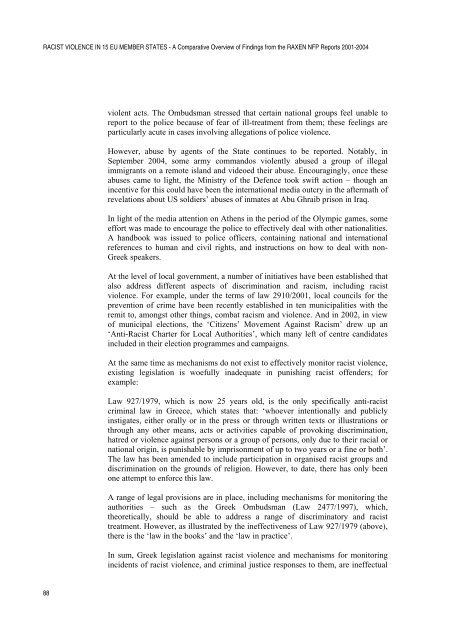RACIST VIOLENCE IN 15 EU MEMBER STATES - Cospe
RACIST VIOLENCE IN 15 EU MEMBER STATES - Cospe
RACIST VIOLENCE IN 15 EU MEMBER STATES - Cospe
Create successful ePaper yourself
Turn your PDF publications into a flip-book with our unique Google optimized e-Paper software.
<strong>RACIST</strong> <strong>VIOLENCE</strong> <strong>IN</strong> <strong>15</strong> <strong>EU</strong> <strong>MEMBER</strong> <strong>STATES</strong> - A Comparative Overview of Findings from the RAXEN NFP Reports 2001-2004<br />
violent acts. The Ombudsman stressed that certain national groups feel unable to<br />
report to the police because of fear of ill-treatment from them; these feelings are<br />
particularly acute in cases involving allegations of police violence.<br />
However, abuse by agents of the State continues to be reported. Notably, in<br />
September 2004, some army commandos violently abused a group of illegal<br />
immigrants on a remote island and videoed their abuse. Encouragingly, once these<br />
abuses came to light, the Ministry of the Defence took swift action – though an<br />
incentive for this could have been the international media outcry in the aftermath of<br />
revelations about US soldiers’ abuses of inmates at Abu Ghraib prison in Iraq.<br />
In light of the media attention on Athens in the period of the Olympic games, some<br />
effort was made to encourage the police to effectively deal with other nationalities.<br />
A handbook was issued to police officers, containing national and international<br />
references to human and civil rights, and instructions on how to deal with non-<br />
Greek speakers.<br />
At the level of local government, a number of initiatives have been established that<br />
also address different aspects of discrimination and racism, including racist<br />
violence. For example, under the terms of law 2910/2001, local councils for the<br />
prevention of crime have been recently established in ten municipalities with the<br />
remit to, amongst other things, combat racism and violence. And in 2002, in view<br />
of municipal elections, the ‘Citizens’ Movement Against Racism’ drew up an<br />
‘Anti-Racist Charter for Local Authorities’, which many left of centre candidates<br />
included in their election programmes and campaigns.<br />
At the same time as mechanisms do not exist to effectively monitor racist violence,<br />
existing legislation is woefully inadequate in punishing racist offenders; for<br />
example:<br />
Law 927/1979, which is now 25 years old, is the only specifically anti-racist<br />
criminal law in Greece, which states that: ‘whoever intentionally and publicly<br />
instigates, either orally or in the press or through written texts or illustrations or<br />
through any other means, acts or activities capable of provoking discrimination,<br />
hatred or violence against persons or a group of persons, only due to their racial or<br />
national origin, is punishable by imprisonment of up to two years or a fine or both’.<br />
The law has been amended to include participation in organised racist groups and<br />
discrimination on the grounds of religion. However, to date, there has only been<br />
one attempt to enforce this law.<br />
A range of legal provisions are in place, including mechanisms for monitoring the<br />
authorities – such as the Greek Ombudsman (Law 2477/1997), which,<br />
theoretically, should be able to address a range of discriminatory and racist<br />
treatment. However, as illustrated by the ineffectiveness of Law 927/1979 (above),<br />
there is the ‘law in the books’ and the ‘law in practice’.<br />
In sum, Greek legislation against racist violence and mechanisms for monitoring<br />
incidents of racist violence, and criminal justice responses to them, are ineffectual<br />
88
















